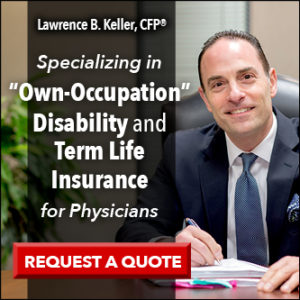Today we have a guest post from Christopher Yerington, MD, who learned the hard way about what disability coverage really means and what it takes to get your benefits. You will find his experience enlightening.
Physicians and Dentists often wrongly believe their hospital, group, or practice, provides them with a good group disability insurance policy. The expectations they harbor, are unfortunately, often very mistaken.
There are both good and bad group insurance policies out there for physicians and dentists. I’d like to point you to what you should be looking for and what you should look to avoid in a group disability insurance package for your practice.
Normally, Individual Disability Insurance (IDI) is purchased early in one’s career. This private individual coverage is tailored specifically to your specialty and the types of procedures you perform. IDI is considered the gold standard, but some doctors are unable to get it due to their medical histories. If you don’t have IDI currently, contact an independent insurance broker and find out what you can qualify for today. And I do mean Today! Do not procrastinate on this. One third of you will have a disability lasting up to a year at some point in your career. It could happen tomorrow! One quarter of you will be out of work between one and seven years. If you do have IDI, group disability insurance can bridge some gaps in coverage.
Physicians and Dentists have complex compensation programs. This requires proper financial attention and definitions in the disability insurance contract itself, as well as additional expertise in understanding the impact on a disability claim. Due to the many years spent building their expertise and practices, they tend to return to work part-time at a much higher rate than other professions. These work situations require a great amount of flexibility and proficiency in managing claims and benefits within their disability insurance policy.
Physicians and Dentists also typically work more than 40 hours a week, and many will choose to work beyond normal retirement age. These professionals also face disease exposures and other hazards that are specific to their specialties.
Many Group Disability policies contain disability restrictions and provisions. The ability to manage their disability and subsequently return to work, can be impeded by the group disability policy provisions!
Here are some possible restrictive items to look out for in your Group Disability Insurance:
- Definitions of disability that are too broad and non-specific, potentially disqualifying you from receiving benefits.
- Some Group policies fail to take into consideration a doctor’s unique lagged income stream when calculating benefit amounts.
- Beware of international travel and residency issues that can effect foreign doctors.
- Ridiculous part-time work offsets that can rapidly reduce benefits.
- Requirements to work at a level pre-determined by the insurance carrier.
- Benefits that are contingent on participation in and completion of rehabilitation programs specified by the insurance carrier and not your own physician.
- Demands for specific limits on hours worked that are not realistic in a healthcare setting when attempting to return to work or to rebuild a practice.
- Benefits that can be reduced for self-reported symptoms. (Even though you are a physician you cannot report your own symptoms, or you might lose benefits)
- Most, if not all group disability products limit mental illness and substance abuse problems. The carriers may require treatments that might not be in your best interests but if not completed, you guessed it, you lose benefits.

A good Group Disability Product will never have these limiting provisions that can be harmful when a claim is filed. This includes restrictions based on a mythical medical 40-hour work week.
An excellent Group Disability Policy closes the income replacement gap with an extra layer of protection that closely mirrors the key provisions of many IDI policies. Group Disability Insurance should always be Guaranteed Issue and Renewal, with no health statements or medical exams required.
A typical IDI policy definition of disability is known as “True Own Occupation” and is considered the gold standard. Traditional group long term disability definitions tend to be more broad and subjective, ranging from any occupation, to ones noting a specialty or sub-specialty.
Group definitions based on CPT or CDT procedure codes may be as close to “Own Occupation” as you can get in a Group product. This clearly defines what a physician or dentist has been doing for the previous year as the basis for whether or not they can still perform their usual procedures. Be sure the group policy you have narrows the definition of disability down to identify your own specific procedures.
That means you should look for “Own-Procedures Protection” definitions of disability in your Group policy. Under that definition, when you submit a disability claim, your actual CPT billing codes for the previous 12 months should be used to calculate how the disability impedes your ability to do the procedures you have built your practice on. If you cannot perform one or more of those actual procedures, you should be considered disabled and eligible for benefits. There should be absolutely no income test when this is the case.
Medical and dental practices are unique. They are high earners, have lots of schooling, ongoing training and licensing requirements, as well as obligatory support staff. Many will have IDI but their actual incomes are far more than the maximum allowable IDI limits. They often are practice owners or in partnerships that demand certain financial obligations even if they cannot practice, or have ongoing overhead expenses that they may remain obligated to pay even if disabled. You should pursue the best protection you can get for these “obligations.”
Most practices are built around specific procedures and doctors should be covered if a disability prevents them from doing their usual procedures, even if they can still practice in a modified manner. Medical Professionals return to work at twice the rate of other professionals. They consider themselves experts in disabling conditions, so they expect their opinion to be considered, and to have choices in when and how to return to work after a disabling event.
Does your current group policy give you the choice of when and in what capacity you return to work part-time? There should be no mandatory rehab or mandatory part-time work requirements like most traditional group long term disability policies. If you choose to work part-time, you should never be penalized for attempting to come back to work as quickly as possible.
It’s important to realize that every group policy is only written for one year. That’s right. At each and every anniversary of your group’s policy, the carrier can unilaterally change the language and provisions. So, the group policy you originally signed up for and you think you still have, may or may not be what you actually have today.
Lastly, look for modular construction in your group carrier so benefits and language can be added in to create a more useful coverage for you and your staff. The result is a disability benefit package that can provide richer supplement features for doctors, while offering solid, more basic coverage for staff. The combination creates a sound overall solution at a compelling price for a group practice.
Protect yourself from your group disability insurance policy by knowing exactly what you have and know what will happen to you if you file a claim. If you cannot find out what is in your current group disability product, that is a red flag. You owe it to yourself, and your staff, to know you have the best protection you can get. Become well informed, and well covered.
Dr. Christopher Yerington retired from clinical anesthesiology due to his own disability in 2010. Because his disability policy did not cover him like he thought it would, he now spends his time educating medical groups and residency programs about the importance of great disability coverage. He resides in Columbus, Ohio. We have no financial affiliation. You can contact him through one of the sites below:
Doximity: https://www.doximity.com/pub/christopher-yerington-md
LinkedIn: https://www.linkedin.com/in/chrisyerington/


After attending a finance course at the ASA, I was lucky enough to get informed about the high risk of disability of all physicians. According to the speaker, as many as a third of docs will never even get to 65 before having forced retirement due to an illness. Terrified, I purchased an own occupation policy the next month and told everyone I know to do the same. Today I have both which seems like overkill, but I intend to let one lapse once I feel my coffers are sufficiently filled. Another great post! This one should be re-cirulated every July.
Great post Cory and something I wish I had when I blindly was doing this early on in my career (although the fact that I even did it gives me some points).
I went with the AMA disability insurance figuring it was a trusted source and would look out for its members. But honestly I was so naive I have no idea what coverage or limitations I have (still don’t). The same thing with my work group policy, just blindly trusted it without review.
I guess I’m lucky never had to utilize either and now at a point where its meaningfulness has lessened dramatically.
But this is a good one for all physicians starting out to read,
Xrayvsn, thanks for your comments. I’m a little concerned that you “still don’t” have any idea what your coverage is. Maybe that would be a good thing to put on your to do list for next week. ToDo: Find out what my disability policy covers.
This is a great post with lots of truth and very well written about the potential dangers of most “group” disability plans!
Thanks Chris, things are not always what they seem
Important stuff.
I got my own disability policy while still a resident and I have maintained it since then. I was so glad to have it in place. I became uninsurable at age 34 (due to an unexpected cancer diagnosis) and was unable to get life insurance or disability insurance ever since. Fortunately, I’m still alive and well nearly 20 years later. Having those in place at age 31 gave me and my family much peace of mind.
Now that I’m past FI, I could probably drop all such policies.
Sorry to hear of your diagnosis Wealthy Doc. You are probably beyond the need of those policies now. They severed their purpose.
It is cases like your that assist me in driving home the message to resident physicians that your health is not guaranteed. I was 39 years old when my clinical career ended. Thank you for sharing! ~Chris